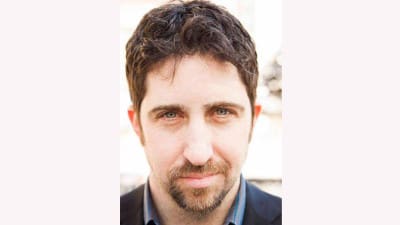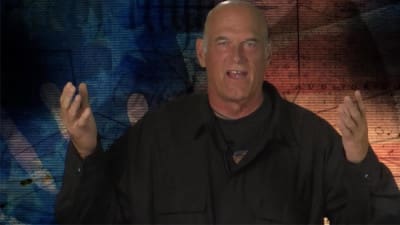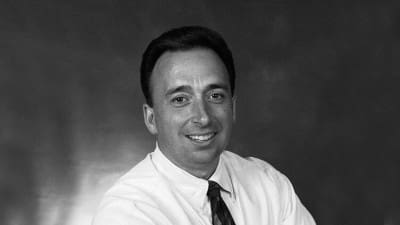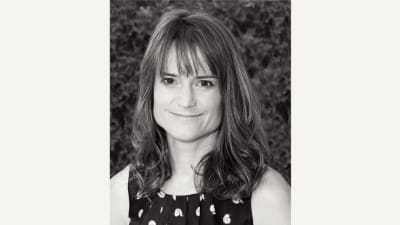For many writers, getting a book published with a major publishing house is the ultimate mark of success, a validation of talent and proof that years of toiling in anonymity were worth it. But for a select few — authors like John Grisham, J.K. Rowling, Nicholas Sparks and others — there’s an even greater pinnacle: when their books are optioned for movies.
It’s a sweet gig for Deneen, a lifelong storyteller. His own novel, The Ninth Circle, was released in January, and he has written several graphic novels in the Flash Gordon and Casper the Friendly Ghost series. He even recruits writers to pen books based on ideas that he’s developed in house (and that will hopefully soon be playing at a cinema near you).
Here, Deneen discusses Hollywood’s love affair with the literary world and how new writers can get in on the book-to-film fun.At Macmillan Publishers, authors who hope to see their stories on the silver screen must undoubtedly go through Brendan Deneen.
As the executive editor of the brand-new Macmillan Entertainment Group, he shops TV and film rights for all of the company’s signees. For example, Deneen successfully sold the crime novel American Blood by young New Zealand author Ben Sanders to Warner Bros. — and Bradley Cooper has signed on to star in the film.
Name: Brendan Deneen
Position: Executive editor, Macmillan Entertainment Group
Resume: Moved to New York to write and act; landed a job at William Morris Agency (now William Morris Endeavor) at 28. After a year, left to become a junior associate at Scott Rudin Productions, facilitating the book-to-film process for two years. Became an executive in the same book-to-film capacity for Bob and Harvey Weinstein, which provided the opportunity to dabble in production and development work. Four years later became a literary agent before landing a job as editor at Thomas Dunne Books (a division of Macmillan/St. Martin’s Press). After closing a deal with a film company, was ultimately called on to represent all titles for Macmillan.
Birthday: “Only my hairdresser knows for sure.”
Hometown: Windsor, Conn.
Education: University of Scranton, with a pit stop at the University of Glasgow in Scotland
Marital status: Married
Media mentor(s): Mark Roybal (currently at 20th Century Fox), Andrew Rona (most recently at Joel Silver Pictures), Thomas Dunne
Best career advice received: Shut up and listen.
Guilty pleasure: Entertainment Weekly
Last book read: Catching Fire, by Suzanne Collins
Twitter handle: @BrendanDeneen
What are the primary functions of your new role as executive editor of Macmillan Entertainment?
The primary role is that I create ideas for books. I create the ideas by myself or with other editors, write the outlines, and then hire authors to write the books. We control the rights, so I then turn around and, using my experience in Hollywood, hopefully sell those rights to film or television companies.
And do you still work in the traditional sense, acquiring books from authors?
Yes. Traditionally, agents and authors don’t give publishing companies movie and TV rights; that’s just not the way it’s done.
So I am still getting submissions the old-fashioned way, and I welcome and love those because you never know what’s going to come your way. But because of this new division, I am looking for an opportunity to at least shop them on behalf of the agents.
A lot of agencies will hire or work with other film agencies to sell the rights, so I’m just replacing that for some of the literary agencies out there, taking the same commission that a film agent would take. So it’s a win-win because they would be doing this anyway.
Instead of using another agent to do this, they can use me — somebody who’s working for the publishing company, who’s invested in the book already, who wants the book to succeed.
With Macmillan retaining the rights to works developed in house, how do you ensure the authors are not taken advantage of?
I really believe in honoring authors. [They] get an advance, just like they always would in a book deal. They get their name on the cover. They get a piece of all profits — royalties, movie money, foreign sales, merchandising, everything. It’s very author friendly.
As a former agent and an author myself, I’m not in this to take advantage of people. I happen to have a ton of ideas that I’ve created and I continue to create, and I can’t write them all myself. Not a single one of my authors has written one of these and not put their own information or ideas into the book, and I love that.
When we work together it’s very collaborative. And it’s a great opportunity, especially for up-and-coming authors who haven’t been able to sell their books and are looking for their big break, or someone who’s looking for a commercial idea to break them through. And also, I’m not so cynical as to want to churn out bad books just to hopefully make a movie.
How can authors position themselves to have an opportunity to write for you?
I go to agents when I have an idea and I’m looking for authors who are a good match. So the key is for an author to get an agent. I know it’s easier said than done, but that’s the most important thing.
And then, for me specifically, because I’m doing Macmillan Entertainment, I need to have some kind of hand in the film rights, even if it’s just six months to shop the material on behalf of the literary agent. But the good news is that I have a pretty decent success rate, so it’s not something that’s like a shot in the dark.
So if the agent has unsuccessfully pitched you on an original idea, you would still keep the author in mind for one of your ideas developed in house?
Absolutely. Or an agent calls me and says, I have this great author, really hungry, is totally open to collaborating, what do you have? And I’m like, ‘Oh, I have this one thing,’ and then I’ll pitch it, and they may say it’s perfect for them, or, no, it’s probably not, what else do you have? So we go out fairly wide, and we have people write sample chapters.
It’s almost like a reality show. We pick a winner; they write the book; they win the book contract. But we take it very seriously, and we want the perfect match for each book. And like I said, it’s a circumstance in which everybody wins.
Why does Hollywood turn to published books so often for content? And what does that mean for writers?
As a writer, I think you gotta write what’s in your heart. I think that trying to adjust your story or style for any other reason than just the book is a mistake, honestly.
If you happen to have a commercial instinct, then that’s great. But there’s no guarantee that your book will ever, first off, get published — let alone get optioned. So I think you have to be true to what you believe as an artist.
As to why [Hollywood likes published books], I think the idea of a book means that it’s been vetted. It’s been looked at by an agent already, by an editor. It’s a source material that’s got fans, marketing, publicity and sales that are already in place. Hollywood likes that; that’s why they’re always looking for franchises.
That’s why you hear about exciting stuff like Hunger Games and Harry Potter. They’ll go for anything these days. Ouija board is being made into a movie; Battleship was made into a movie. They want stuff that has pre-existing fans, and sometimes it works and sometimes it doesn’t.
So what is the best way for an established author to break into TV and film, aside from being lucky enough to work with you?
It’s really up to your agent. If you have an agent at CAA, ICM, William Morris or one of the big agencies, they have TV and film divisions, so hopefully your agent will pass your stuff on. One of the things I’ve said in other interviews is that patience is key. I’m 41 and I wrote my first book when I was 18, and I sold my novel this year. It took me forever.
And that doesn’t mean you have to not be putting yourself out there and working your ass off; it just means you may get rejected over and over again like I did when I was 18 and I wallpapered my bathroom in college with rejection letters. It should be a badge of honor. It means you’re getting stuff out there.
And you just have to keep trying. Finish one book, but don’t just spend your life sending out query letters. Send out the query letters to agents, but be writing book two. And finish book two, send out query letters for that and then write book three.
You need to be constantly writing. If you’re a screenwriter, you should be writing a new screenplay every three or four months. If you’re an author, honestly, you should have a new book every year if you’re serious about it — two years at the most.
If your legacy is based solely on your work with Macmillan, and no one ever reads your books, will you be OK with that?
I’ve always wanted to be a writer. I wrote Flash Gordon for a while; I worked on Casper the Friendly Ghost. I actually sold two of my novels this year, and I’m writing a very high-profile graphic novel for next Christmas.
I’m not saying I’m a well-known author by any stretch of the imagination, but I’ve gotten fan mail from random people, and if that’s all I get for the rest of my life, I can live with it. It’s nice that I’ve made any impact.
Would I like more? Yeah, who wouldn’t? But if I just get this little piece of the pie as an author then that’s great. And then, for my day job, if I can break out new authors or find someone who goes on like Kara [Taylor] to do bigger and better things, or if I create a franchise that becomes a huge hit, it’ll be a cool legacy.
I’m having fun and that’s really, honestly, the most important thing for me. I love creating stories. So if I can make a living creating stories for myself and for other people, then I’m living the life I want.
This interview has been edited for length and clarity.









